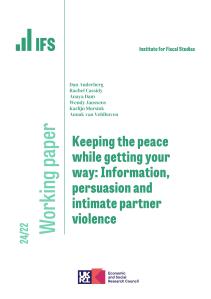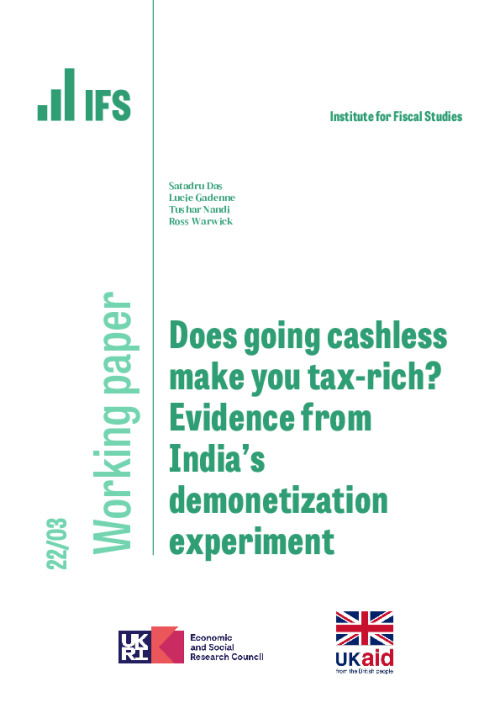Downloads
This paper investigates the effect of electronic payments technology on firms’ tax compliance in a large developing economy. We consider India’s demonetization policy which, by limiting the availability of cash, led to a large increase in the use of electronic forms of payments. Using administrative data on firms’ tax returns and variation in the strength of the demonetization shock across local areas, we find that greater use of electronic payments leads to firms reporting more sales to the tax authorities. This effect is strong enough to explain roughly half of the large (11%) increase in reported sales observed during demonetization.
Authors

Associate Director
Lucie is an Associate Director at the IFS and an Associate Professor at Queen Mary University of London.

International Research Associate
Ross joined the IFS in 2016 and works in a couple of areas of IFS research.

Tushar Nandi

Satadru Das
Working Paper details
- DOI
- 10.1920/wp.ifs.2022.0322
- Publisher
- Institute for Fiscal Studies
Suggested citation
Das, S et al. (2022). Does going cashless make you tax-rich? Evidence from India’s demonetization experiment. London: Institute for Fiscal Studies. Available at: https://ifs.org.uk/publications/does-going-cashless-make-you-tax-rich-evidence-indias-demonetization-experiment (accessed: 30 June 2024).
More from IFS
Understand this issue

Election Special: Your questions answered
27 June 2024

Election Special: The big issues politicians haven't spoken about
25 June 2024

Election Special: The Labour manifesto explained
14 June 2024
Policy analysis

How would the parties’ tax and spending plans affect Scotland and Wales?
28 June 2024

What are the parties’ plans for benefits and taxes?
24 June 2024

Plaid Cymru manifesto: a response
13 June 2024
Academic research

Targeting men, women or both to reduce child marriage
28 May 2024

Keeping the peace whilst getting your way: Information, persuasion and intimate partner violence
17 May 2024

Forced displacement, mental health, and child development: Evidence from Rohingya refugees
10 May 2024
